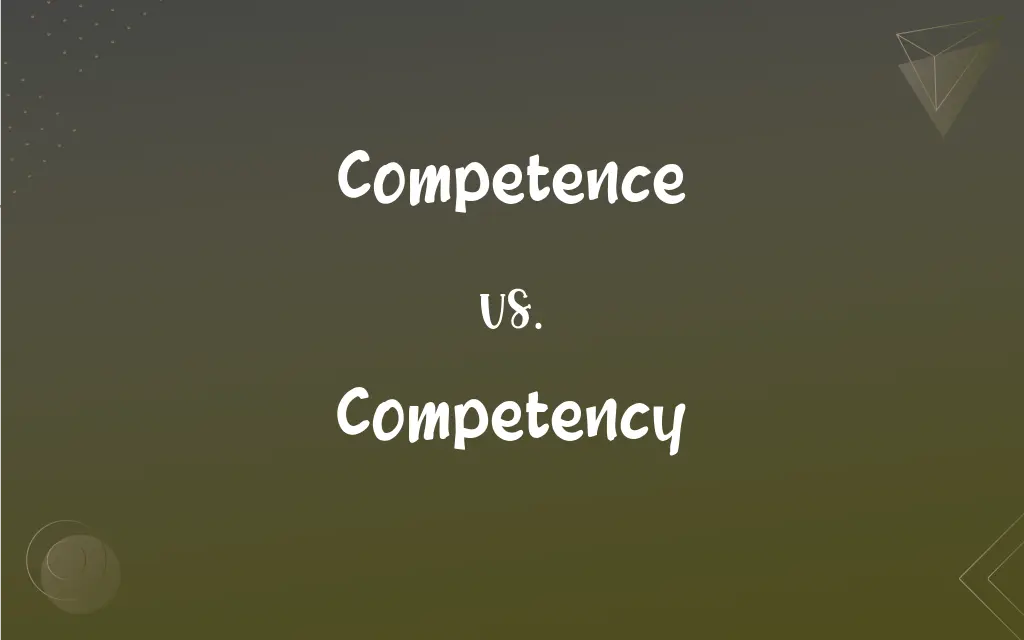Competence vs. Competency: What's the Difference?
Edited by Harlon Moss || By Janet White || Published on December 30, 2023
Competence refers to an individual's overall ability and adequacy in a specific area, while competency often denotes specific skills or attributes within that area.

Key Differences
Competence is a broad term indicating overall capability and effectiveness in a particular field. Competency, however, often refers to specific skills or attributes that contribute to competence.
In a professional context, competence may imply a person's general aptitude and capability in their job. Competency focuses on particular skills or behaviors that are part of that overall competence.
Competence is evaluated based on the overall performance and effectiveness. Competency is measured through individual skills and how they are executed.
Developing competence might involve broad training and education. To develop a competency, specific skill training and targeted learning are usually required.
In business, competence can refer to a company's overall performance and ability in the market. Competency, in contrast, often refers to specific capabilities or advantages a company has.
ADVERTISEMENT
Comparison Chart
Scope
General ability in a specific area
Specific skills or attributes
Application
Overall aptitude and capability
Particular skills contributing to competence
Evaluation
Based on overall performance
Measured through individual skills
Development
Involves broad training and education
Requires specific skill training
Usage in Business
Refers to company's overall performance
Specific capabilities or advantages
ADVERTISEMENT
Competence and Competency Definitions
Competence
Competence implies a sufficient level of expertise to meet a standard.
The surgeon's competence was crucial in the complex operation.
Competency
Competency often implies a measurable or observable skill.
Her competency in coding was demonstrated through her software development.
Competence
Competence is the ability to perform a task effectively and efficiently.
Her competence in project management led to the team's success.
Competency
Competency refers to a specific skill or attribute within a broader ability.
His competency in statistical analysis is invaluable for research.
Competence
Competence encompasses overall skill and knowledge in a particular field.
His competence in law was evident from his successful cases.
Competency
Competency is a distinct element contributing to overall competence.
Her linguistic competency aids her role in international relations.
Competence
Competence is often recognized as general proficiency and aptitude.
His technical competence made him an asset to the IT department.
Competency
Competency can denote a particular ability required for a job.
Effective communication is a key competency for a sales role.
Competence
Competence involves the capability to use various skills cohesively.
Her competence as a teacher is shown through her students' progress.
Competency
Competency can be developed through targeted training.
He enhanced his competency in leadership through specialized courses.
Competence
The ability to do something well or efficiently.
Competency
Competence.
Competence
A range of skill or ability
A task beyond his competence.
Competency
A skill or ability.
Competency
(obsolete) A sufficient supply (of).
Competency
(obsolete) A sustainable income.
Competency
The ability to perform some task; competence.
Competency
(legal) Meeting specified qualifications to perform.
Competency
(linguistics) Implicit knowledge of a language’s structure.
Competency
The quality of being adequately or well qualified physically and intellectually
FAQs
Can competency be measured?
Yes, competency can be specifically measured through assessments or performance.
Is competence the same as being competent?
Yes, competence implies being competent or having the necessary ability.
How is competence relevant in the workplace?
Competence is essential for job performance and career advancement.
Is competence static or can it be improved?
Competence can be improved and developed over time with experience and learning.
How do organizations assess competence?
Organizations assess competence through performance reviews, tests, and evaluations.
How do educators determine student competence?
Educators assess student competence through exams, assignments, and practical applications.
Is academic competence different from professional competence?
Academic competence focuses on educational prowess, while professional competence relates to job skills.
Are competencies limited to professional skills?
No, competencies can also include personal attributes and soft skills.
Does competence include technical skills only?
No, competence includes both technical skills and soft skills.
Do competencies vary by industry?
Yes, competencies vary depending on the specific requirements of different industries.
How can one develop professional competence?
Professional competence can be developed through ongoing education, training, and practical experience.
Is emotional intelligence a competency?
Yes, emotional intelligence is increasingly recognized as a vital competency in various roles.
Can competency lead to career growth?
Yes, developing competencies is key to career progression and success.
Can competencies be innate?
Some competencies might be innate, but most can be developed and honed.
Can a person have multiple competencies?
Yes, an individual can possess multiple specific competencies.
Does competence guarantee job performance?
While competence is critical, job performance also depends on other factors like motivation and environment.
Do competencies change with technology advancements?
Yes, as technology evolves, the competencies required in many fields also change.
Are competencies part of job descriptions?
Yes, job descriptions often list specific competencies required for the role.
Are there universal competencies?
Some competencies, like communication, are universally valued across various fields.
Can competence be overestimated?
Yes, individuals or organizations can sometimes overestimate competence without proper evaluation.
About Author
Written by
Janet WhiteJanet White has been an esteemed writer and blogger for Difference Wiki. Holding a Master's degree in Science and Medical Journalism from the prestigious Boston University, she has consistently demonstrated her expertise and passion for her field. When she's not immersed in her work, Janet relishes her time exercising, delving into a good book, and cherishing moments with friends and family.
Edited by
Harlon MossHarlon is a seasoned quality moderator and accomplished content writer for Difference Wiki. An alumnus of the prestigious University of California, he earned his degree in Computer Science. Leveraging his academic background, Harlon brings a meticulous and informed perspective to his work, ensuring content accuracy and excellence.































































